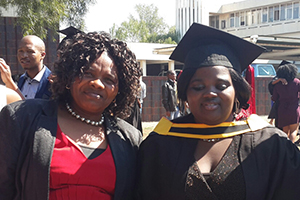
Lutho Xintolo (right) is one of the Centre for Universal Access and Disability Support 2016 graduates. She is currently pursuing her Honours in Psychology.
Photo: Supplied |
Once again, the University of the Free State (UFS) hosted a successful series of graduations from 12-15 April 2016 where 3681 students were conferred qualifications at the Bloemfontein Campus. Among those graduating were 22 students who are affiliated with the university’s Center for Universal Access and Disability Support (CUADS).
Some of these students included Zingisa Ngwenya, who is currently busy with her second degree; Grant Lombaard, Zanele Morerwa, and Lutho Xintolo, all of whom are pursuing their Honours degrees. Louzanne Coetzee, a visually-impaired international champion athlete, was awarded a Communication: Corporate Marketing Honours degree this autumn. “We have five athletes and a cyclist with disabilities, amongst our students who are of world-class standard,” said Martie Miranda, Head of the Center.
“The Center assists students to gain access to study courses, buildings, and lecture venues, learning material such as Braille, audio, enlarged print, and E-text, computer facilities with assistive technology and software and adapted hardware, and a specialised examination and test venue for alternative test and exam procedures,” Miranda added.
Students with disabilities who enrol with CUADS receive support according to their individual needs from registration through to graduation. “During this process we identify challenges experienced in their administrative, academic, support, student life, and physical environments, and then address these challenges,” Miranda said.
Support provided by the Center includes amanuenses and extra time during tests and exams according to the student’s specific needs, (as determined through evaluation by the Extra Time Panel), together with Student Counselling and Development, academic tutors provided by the New Academic Tutor programme in collaboration with the UFS Centre for Teaching and Learning, and Sign Language interpreters or lip-speakers as well as real-time captioning.
Students with specific learning difficulties, mobility, visual, or hearing impairments, psychological, or other chronic conditions that might have a disabling effect on them, as well as those with temporary impairments, are fully supported by the CUADS. The Center strives to ensure that students achieve their full potential throughout their journey with our university.